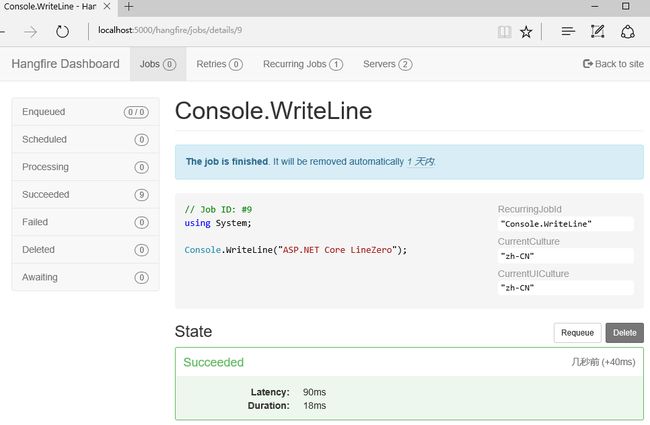ASP.NET Core开发-后台任务利器Hangfire使用
SP.NET Core开发系列之后台任务利器Hangfire 使用。
Hangfire 是一款强大的.NET开源后台任务利器,无需Windows服务/任务计划程序。
可以使用于ASP.NET 应用也可以使用于控制台。Hangfire 只需简单几句代码即可创建新的不同种类的任务。
目前 Hangfire 已经支持.NET Core ,现在就给大家讲解下在ASP.NET Core 里的使用。
Hangfire GitHub:https://github.com/HangfireIO/Hangfire
官网:http://hangfire.io/
相关文档介绍:http://docs.hangfire.io/en/latest/
首先我们新建一个ASP.NET Core Web Application
选择模板-》空的模板
然后添加引用:
NuGet 命令行执行
Install-Package Hangfire
添加好引用以后我们就可以来使用。
打开Startup.cs
首先在ConfigureServices 方法中注册服务:
public void ConfigureServices(IServiceCollection services)
{
services.AddHangfire(r=>r.UseSqlServerStorage("Data Source=.;Initial Catalog=HangfireDemo;User ID=sa;Password=123456"));
}
这里是配置数据库,数据库需要确保存在,这里配置的是SQL Server数据库,目前官方支持SQL Server。
然后在Configure 方法中加入HangfireServer及HangfireDashboard:
![]()
public void Configure(IApplicationBuilder app, IHostingEnvironment env, ILoggerFactory loggerFactory)
{
loggerFactory.AddConsole();
if (env.IsDevelopment())
{
app.UseDeveloperExceptionPage();
}
app.UseHangfireServer();
app.UseHangfireDashboard();
app.Run(context =>
{
return context.Response.WriteAsync("Hello from ASP.NET Core!");
});
}
![]()
然后选择Kestrel执行,访问地址:http://localhost:5000/hangfire
成功运行,下面我们就可以来添加任务了。
![]()
app.Map("/index", r =>
{
r.Run(context =>
{
//任务每分钟执行一次
RecurringJob.AddOrUpdate(() => Console.WriteLine($"ASP.NET Core LineZero"), Cron.Minutely());
return context.Response.WriteAsync("ok");
});
});
app.Map("/one", r =>
{
r.Run(context =>
{
//任务执行一次
BackgroundJob.Enqueue(() => Console.WriteLine($"ASP.NET Core One Start LineZero{DateTime.Now}"));
return context.Response.WriteAsync("ok");
});
});
app.Map("/await", r =>
{
r.Run(context =>
{
//任务延时两分钟执行
BackgroundJob.Schedule(() => Console.WriteLine($"ASP.NET Core await LineZero{DateTime.Now}"), TimeSpan.FromMinutes(2));
return context.Response.WriteAsync("ok");
});
});
![]()
这里创建任务只是为了方便,我们也可以在初始化的时候创建,也可以在controller 中创建。
下面我们来执行。
首先访问 http://localhost:5000/index
然后访问 http://localhost:5000/await
最后访问 http://localhost:5000/one
这样任务也就都执行起来了。
Jobs 也就是查看所有的任务,我们可以在节目界面操作运行及删除,很方便。
我们还可以点击任务,查看任务详情。以及任务执行结果。
最终运行一段时间,还有图表展示
Startup.cs 完整代码:
![]()
![]()
1 public class Startup
2 {
3 // This method gets called by the runtime. Use this method to add services to the container.
4 // For more information on how to configure your application, visit http://go.microsoft.com/fwlink/?LinkID=398940
5 public void ConfigureServices(IServiceCollection services)
6 {
7 services.AddHangfire(r=>r.UseSqlServerStorage("Data Source=.;Initial Catalog=HangfireDemo;User ID=sa;Password=123456"));
8 }
9
10 // This method gets called by the runtime. Use this method to configure the HTTP request pipeline.
11 public void Configure(IApplicationBuilder app, IHostingEnvironment env, ILoggerFactory loggerFactory)
12 {
13 loggerFactory.AddConsole();
14
15 if (env.IsDevelopment())
16 {
17 app.UseDeveloperExceptionPage();
18 }
19
20
21 app.UseHangfireServer();
22 app.UseHangfireDashboard();
23
24 app.Map("/index", r =>
25 {
26 r.Run(context =>
27 {
28 //任务每分钟执行一次
29 RecurringJob.AddOrUpdate(() => Console.WriteLine($"ASP.NET Core LineZero"), Cron.Minutely());
30 return context.Response.WriteAsync("ok");
31 });
32 });
33
34 app.Map("/one", r =>
35 {
36 r.Run(context =>
37 {
38 //任务执行一次
39 BackgroundJob.Enqueue(() => Console.WriteLine($"ASP.NET Core One Start LineZero{DateTime.Now}"));
40 return context.Response.WriteAsync("ok");
41 });
42 });
43
44 app.Map("/await", r =>
45 {
46 r.Run(context =>
47 {
48 //任务延时两分钟执行
49 BackgroundJob.Schedule(() => Console.WriteLine($"ASP.NET Core await LineZero{DateTime.Now}"), TimeSpan.FromMinutes(2));
50 return context.Response.WriteAsync("ok");
51 });
52 });
53
54
55 app.Run(context =>
56 {
57 return context.Response.WriteAsync("Hello from ASP.NET Core!");
58 });
59 }
60 }
![]()
通过Hangfire, 这样我们就可以很方便的在ASP.NET Core 里创建后台任务。而且提供管理界面供我们操作。
后台常用任务调度创建和使用:
注意:WriteLog是自己封装的一个通用记录日志的方法!
![]()
//支持基于队列的任务处理:任务执行不是同步的,而是放到一个持久化队列中,以便马上把请求控制权返回给调用者。
var jobId = BackgroundJob.Enqueue(()=>WriteLog("队列任务执行了!"));
//延迟任务执行:不是马上调用方法,而是设定一个未来时间点再来执行,延迟作业仅执行一次
var jobId = BackgroundJob.Schedule(()=>WriteLog("一天后的延迟任务执行了!"),TimeSpan .FromDays(1));//一天后执行该任务
//循环任务执行:一行代码添加重复执行的任务,其内置了常见的时间循环模式,也可基于CRON表达式来设定复杂的模式。【用的比较的多】
RecurringJob.AddOrUpdate(()=>WriteLog("每分钟执行任务!"), Cron.Minutely); //注意最小单位是分钟
//延续性任务执行:类似于.NET中的Task,可以在第一个任务执行完之后紧接着再次执行另外的任务
BackgroundJob.ContinueWith(jobId,()=>WriteLog("连续任务!"));
注意,周期性使用可以使用Cron表达式。
# ┌───────────── minute (0 - 59) # │ ┌───────────── hour (0 - 23) # │ │ ┌───────────── day of the month (1 - 31) # │ │ │ ┌───────────── month (1 - 12) # │ │ │ │ ┌───────────── day of the week (0 - 6) (Sunday to Saturday; # │ │ │ │ │ 7 is also Sunday on some systems) # │ │ │ │ │ # │ │ │ │ │ # * * * * * command to execute
| Entry | Description | Equivalent to |
|---|---|---|
@yearly (or @annually) |
每年1月3号2:01分运行 | 1 2 3 1 * |
@monthly |
每月3号2:01分运行 | 1 2 3 * * |
@weekly |
每周日的2:01分运行 | 1 2 * * 0 |
@daily |
每天的2:01分运行 | 1 2 * * * |
@hourly |
每小时的1分运行 | 1 * * * * |
@reboot |
Run at startup | N/A |
博客示例代码GitHub:https://github.com/linezero/Blog
Hangfire相关使用学习资料:
官网地址:https://www.hangfire.io/
GitHub源码:https://github.com/HangfireIO/Hangfire
中文文档:https://www.bookstack.cn/read/Hangfire-zh-official/README.md
GitHub使用示例源码:https://github.com/HangfireIO/Hangfire.Samples(包括控制台应用程序,window服务,ASP.NET MVC,WebForm)
Hangfire使用文章汇总:https://www.bbsmax.com/R/xl56E0nrJr/
https://www.cnblogs.com/owenzh/p/11623869.html



